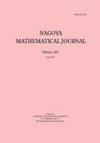EXTENSIONS OF CHARACTERS IN TYPE D AND THE INDUCTIVE MCKAY CONDITION, I
IF 0.8
2区 数学
Q2 MATHEMATICS
引用次数: 11
Abstract
This is a contribution to the study of $\mathrm {Irr}(G)$ as an $\mathrm {Aut}(G)$ -set for G a finite quasisimple group. Focusing on the last open case of groups of Lie type $\mathrm {D}$ and $^2\mathrm {D}$ , a crucial property is the so-called $A'(\infty )$ condition expressing that diagonal automorphisms and graph-field automorphisms of G have transversal orbits in $\mathrm {Irr}(G)$ . This is part of the stronger $A(\infty )$ condition introduced in the context of the reduction of the McKay conjecture to a question about quasisimple groups. Our main theorem is that a minimal counterexample to condition $A(\infty )$ for groups of type $\mathrm {D}$ would still satisfy $A'(\infty )$ . This will be used in a second paper to fully establish $A(\infty )$ for any type and rank. The present paper uses Harish-Chandra induction as a parametrization tool. We give a new, more effective proof of the theorem of Geck and Lusztig ensuring that cuspidal characters of any standard Levi subgroup of $G=\mathrm {D}_{ l,\mathrm {sc}}(q)$ extend to their stabilizers in the normalizer of that Levi subgroup. This allows us to control the action of automorphisms on these extensions. From there, Harish-Chandra theory leads naturally to a detailed study of associated relative Weyl groups and other extendibility problems in that context.类型d中字符的扩展和归纳McKay条件
这是对有限拟单群G的$\mathrm {Irr}(G)$作为$\mathrm {Aut}(G)$ -集的研究的一个贡献。关注李型群$\mathrm {D}$和$^2\mathrm {D}$的最后一个开放情况,一个关键的性质是所谓的$A'(\infty )$条件,表示G的对角自同构和图场自同构在$\mathrm {Irr}(G)$中具有横向轨道。这是在将McKay猜想简化为一个关于拟单群的问题时引入的更强$A(\infty )$条件的一部分。我们的主要定理是,对于类型为$\mathrm {D}$的组,条件$A(\infty )$的最小反例仍然满足$A'(\infty )$。这将在第二篇论文中使用,以完全建立$A(\infty )$的任何类型和排名。本文采用Harish-Chandra归纳法作为参数化工具。给出了Geck和Lusztig定理的一个新的、更有效的证明,证明了$G=\mathrm {D}_{ l,\mathrm {sc}}(q)$的任意标准Levi子群的丘形特征在该Levi子群的归一化域中扩展到它们的稳定子群。这允许我们控制自同构在这些扩展上的作用。从那里,Harish-Chandra理论自然导致了对相关的相对Weyl群和其他可扩展性问题的详细研究。
本文章由计算机程序翻译,如有差异,请以英文原文为准。
求助全文
约1分钟内获得全文
求助全文
来源期刊
CiteScore
1.60
自引率
0.00%
发文量
31
审稿时长
6 months
期刊介绍:
The Nagoya Mathematical Journal is published quarterly. Since its formation in 1950 by a group led by Tadashi Nakayama, the journal has endeavoured to publish original research papers of the highest quality and of general interest, covering a broad range of pure mathematics. The journal is owned by Foundation Nagoya Mathematical Journal, which uses the proceeds from the journal to support mathematics worldwide.

 求助内容:
求助内容: 应助结果提醒方式:
应助结果提醒方式:


